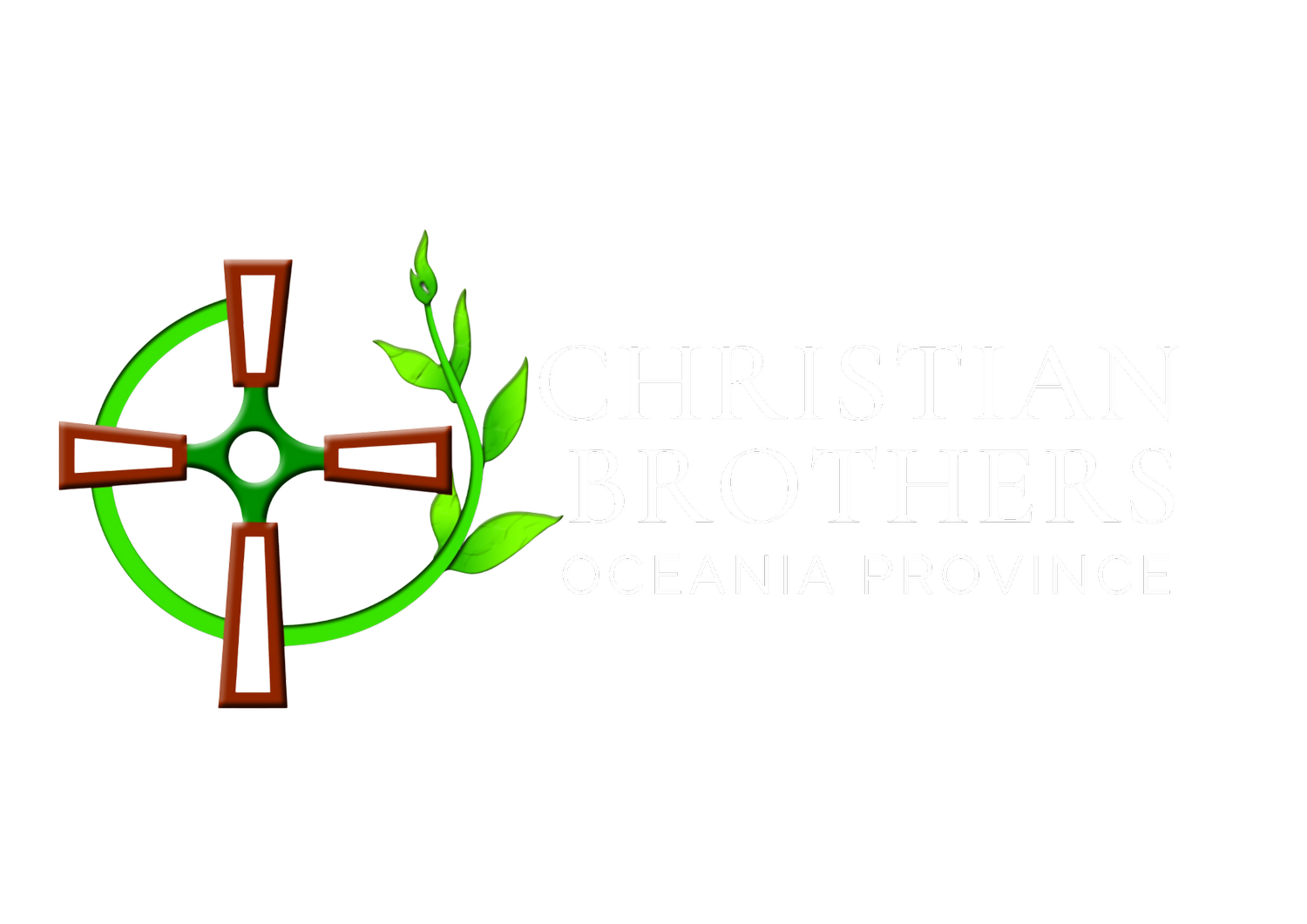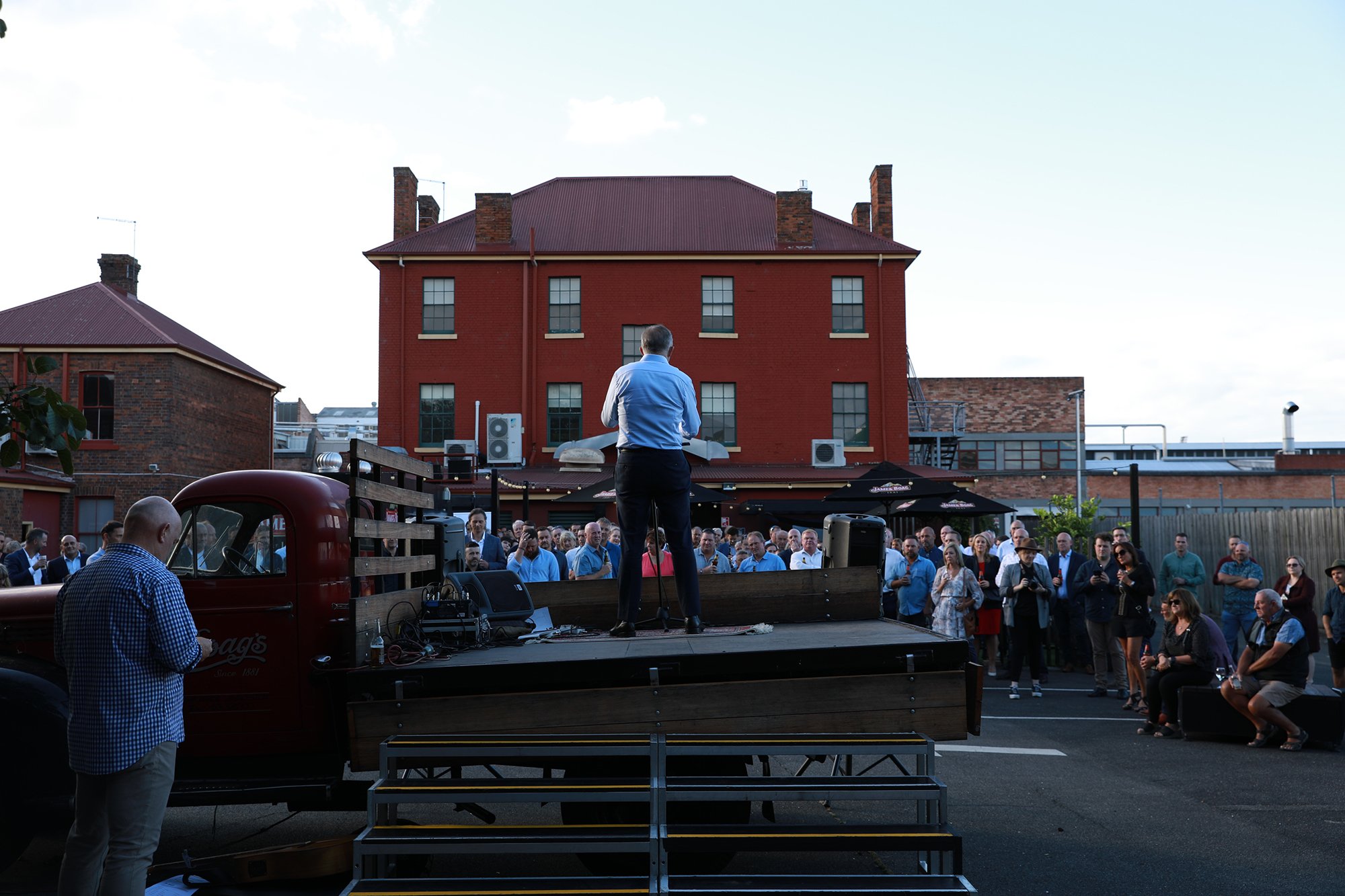
Parliament House Canberra, Australia
Australian Prime Minister Anthony Albanese - The Boy from St Mary's Cathedral College
“I grew up in council housing in Camperdown, in one of those neighbourhoods where everybody knew everybody – for better, or for worse. We were a real tight knit community..." "
~ Anthony Albanese
Anthony Albanese, Member for Grayndler, addressed Year 11 Students at Christian Brothers High School Lewisham in 2017. Now as Australia’s 31st Prime Minister, his faith in “serving a neighbour for the love of God” in large part can be attributed to his own Christian Brothers education at St Mary’s Cathedral College in Sydney.
“Were we to know the merit and value of only going from one street to another to serve a neighbour for the love of God, we should prize it more than silver and gold.”
I grew up in council housing in Camperdown, in one of those neighbourhoods where everybody knew everybody – for better, or for worse.
We were a real tight knit community.
So when the Sydney City Council decided to sell-off our houses, the residents banded together to fight the decision, eventually winning.
You see, we weren’t just fighting for bricks and mortar.
We were fighting for our homes.
For our community.
For respect.
If this sounds like a familiar tale, you would be right.
Recently, the NSW Government sold more than 200 homes in Millers Point.
It intends to do the same with the iconic Sirius Building in the Rocks.
Residents, like 90 year old Myra Demetriou from Sirius, have lived in the area for more than sixty years.
They don’t know anything else.
But they do know the intricacies of their neighbourhood.
They know their local doctor.
They know the people next door.
Now the Government argues that through the sale of these homes more funding will be available to build extra social housing elsewhere in Sydney.
As students, as future leaders, this is something for you to think about - what would you do?
The so-called greater good argument can be convincing.
On a simplistic level, the argument that many more people will benefit from the sale of these homes than those adversely impacted sounds attractive.
But this argument does not stand up to proper scrutiny.
This is certainly the case for those directly impacted, but it is also the case for the health of the city as a whole.
I fundamentally believe successful cities are not disconnected enclaves of privilege and disadvantage.
They are diverse.
Their people come from a multitude of backgrounds.
People are connected to their communities.
“The world has shifted dramatically since Edmund Rice founded his schools, the legacy of which is your school today...but I believe many of the same principles still hold their relevance...”
EDMUND RICE IN TODAY’S WORLD
This brings me to Edmund Rice.
It was Edmund Rice who said:
"Were we to know the merit and value of only going from one street to another to serve a neighbour for the love of God, we should prize it more than silver and gold."
But the world has shifted dramatically since Edmund Rice founded his schools, the legacy of which is your school today.
Indeed, the world has changed since my childhood and teenage years spent growing up in Camperdown and attending a Christian Brothers’ school, St Mary’s Cathedral.
The challenges you face are different.
But I believe many of the same principles still hold their relevance.
Sydney is a brilliant city.
We’re on track for rapid growth.
The fact is; urbanisation is transforming our nation.
As our cities grow, and increase in density, we need to think about how we can create opportunities to build and enhance the quality of life of local communities.
So that people choose to cross the street, as Edmund Rice said, to help a neighbour.
As the Shadow Minister for Cities, this is something I’m passionate about.
GLOBALISATION
But if the world is changing so fast, how can we sustain the social justice agenda of Edmund Rice throughout this century?
In New York, in 2002, Brother Phillip Pinto spoke about the Edmund Rice tradition.
He said:
“Our schools exist to challenge popular beliefs and dominant cultural values, to ask the difficult question, to look at life from the standpoint of the minority, the victim, the outcast, and the stranger.”
The thing is; an aspiration for social justice is always relevant.
It’s always needed.
Particularly now.
What we don’t always understand is that because of globalisation, some people are feeling left behind.
Excluded from opportunities.
Here in the inner west we are the beneficiaries of a globalised world.
I love walking down Marrickville Road and seeing the legacy of the Greek and Italian immigrants, the Portuguese, the Chinese and Vietnamese, and more recently the Lebanese and Pacific Islander communities.
We are so lucky to have won the lottery of life that is living here in Australia.
But this is not the experience of everyone.
Globalisation and the shift to a knowledge-intensive economy, away from manufacturing, mean some people question where they fit in this changing world.
Technology has left many without secure employment, and many of these people blame globalisation.
I was concerned when the Brexit vote in the United Kingdom succeeded.
I was concerned when Donald Trump tapped into the fear of many who felt disenfranchised by the global economy to become President of the United States of America.
And I am concerned every time I’m in Canberra and see Pauline Hanson in the halls of Parliament House.
But the fact is; we need to work hard to understand where this sentiment comes from, so that we can do what we can to fix it.
And this means having the hard discussions.
The onus is on me, as a politician, to make sure all people do feel like they are being heard and represented.
But the onus is also on you, as students, as our nation’s future leaders.
Throughout the history of politics, for some, appealing to division has been a fall- back position when the going gets tough.
Fear-mongering is dangerous because it makes it harder for us to have the important conversations we need to have as a nation; about climate change, about refugees and asylum seekers; about our economy.
UNCERTAIN TIMES
I have a 16 year old son, and so I often reflect upon the challenges faced by your generation.
I worry about housing affordability, where even those in leadership positions have said that the only way young people can get into the property market is to inherit their parent’s home.
I worry about wages growth and employment opportunities.
I worry that in the face of urbanisation, unless we do something, the poor will become poorer and the rich, richer.
But then I walk into a classroom, or talk to a student on the street, and I’m filled with confidence.
It might be the case that there is no such thing as having the one job for life, but I’ve never met a smarter, more capable generation than yours when it comes to adapting to this new phase.
Accepting of each other.
Perceptive about society.
Inquisitive about the best way forward.
These are just some of the qualities I am so pleased to see in people your age today.
CONCLUSION
The fact is, the Edmund Rice tradition is echoed in the simple actions any person can take in their day.
It is about volunteering time to community organisations, which I know many of you do.
Helping those less fortunate than you or I.
But it can also be as simple as being kind to fellow human beings.
Listening, understanding, having patience.
And, sometimes, it can be as hard as speaking up when something is not right.
Even when you are the only person to do so.
As the saying goes, if we are to understand the future, we must first understand the past.
Edmund Rice could not have envisaged the world today when he founded his schools more than 200 years ago.
But since then, the Edmund Rice tradition has lived on and it will continue to do so through your actions.
I urge you to keep challenging the status quo.
Don’t cease asking difficult questions.
And always stand up for those in need.

More Newsletters
-
February 2023
- Feb 21, 2023 St Leo’s College Box Hill
- Feb 13, 2023 The Christian Brothers & Handball
-
December 2022
- Dec 31, 2022 Being Brother in Oceania
- November 2022
-
October 2022
- Oct 28, 2022 Attachment to Processes for Brothers named in the National Redress Scheme (NRS)
- Oct 28, 2022 Guiding Processes for brothers named in the National Redress Scheme (NRS)
- Oct 28, 2022 Reintegrating Brothers Released From Prison Back Into Community Living
- Oct 28, 2022 Brothers’ Safety and Care Plan
- Oct 28, 2022 Guideline for the Management of Christian Brothers who have Sexually Abused Children
- Oct 27, 2022 Guiding Principles for the Retention or Dismissal of Brothers who have offended against children
- Oct 21, 2022 National Day of Sorrow and Promise
- Oct 13, 2022 Anti Poverty Week 2022
- Oct 7, 2022 PNG News ~ Oct 2022
- Oct 7, 2022 Guardians of the Intangibles
- Oct 2, 2022 Ambrose Anniversary Ceremony
- Oct 1, 2022 Br Peter Thrupp ~ Centacare Kimberley
-
September 2022
- Sep 12, 2022 PNG News ~ Dec 2021
-
August 2022
- Aug 15, 2022 Villa Maria House | St Kilda Community | ERCS
- Aug 10, 2022 Referendum | Pharmaceuticals | Laudato Si
- Aug 10, 2022 The Bush Report | Health News
-
July 2022
- Jul 25, 2022 Reflections from the Chapter | Vale Br Alan Moss
- Jul 1, 2022 Plenary Council | Peter Chiller | Sustainability
-
June 2022
- Jun 1, 2022 COVID Update | Travellers | Birthdays
- Jun 1, 2022 NZ Updates | Upcoming Dates
-
May 2022
- May 19, 2022 Br Tony Pawelski Retires
- May 18, 2022 Oceania Chapter Part 2 - Read All the News Here
- May 6, 2022 From the Congregation Leadership Team
-
April 2022
- Apr 20, 2022 Edmund Rice camps | Travellers | Brothers’ Wills
-
February 2022
- Feb 26, 2022 Br Peter Clinch - Feb 26, 2022
- Feb 24, 2022 Edmund Rice Oceania Website - Feb 24, 2022
- Feb 14, 2022 Br Leo Hassam’s Jubilee Celebration
- Feb 1, 2022 Laudato Si | Dr Carmody Grey |
-
October 2021
- Oct 15, 2021 Br Philip Pinto & Collaborative Trust - Oct 15, 2021
- Oct 14, 2021 Work, Health & Safety
- Oct 13, 2021 Member Area Newsletter - Oct 13, 2021
-
September 2021
- Sep 6, 2021 Ambrose Treacy Day
-
May 2021
- May 2, 2021 Requests to Communities for Financial Assistance
- May 1, 2021 Workplace Code Of Conduct
-
January 2021
- Jan 3, 2021 Risk Management
- Jan 2, 2021 Privacy Policy
- Jan 1, 2021 Safeguarding
- Jan 1, 2021 Child Management and Restraint Guideline
- Jan 1, 2021 Long Service Leave
- Jan 1, 2021 Corporate Credit Card
- Jan 1, 2021 Preventing Discrimination, Harassment and Bullying Policy
Purchase Publications
The Edmund Rice Christian Brothers of Oceania assist people wishing to source material about the Christian Brothers and more specifically about the Edmund Rice Brothers in the Oceania Region.

Since 1802 the work that Edmund Rice started has spread to 30 countries….
The Christian Brothers first came to parts of the Oceania Province in 1843. The presence of the Christian Brothers in Oceania began in Sydney and quickly spread throughout Australia, to New Zealand and then later through Papua New Guinea, the Philippines and Timor Leste.
Akaroa, Christchurch, New Zealand











